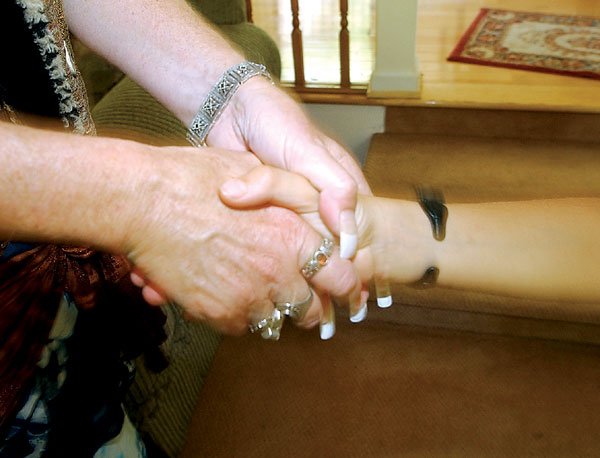When it came to business mixers, Hollister resident Bruce Gesek
did what he saw pretty much everyone else doing at the social hours
he’d attended in the past.
The engineer, who works for Sverdrup Technology, a contract
company with NASA, headed straight for the food table, piled a few
appetizers on his plate and grabbed a soda.
When it came to business mixers, Hollister resident Bruce Gesek did what he saw pretty much everyone else doing at the social hours he’d attended in the past.
The engineer, who works for Sverdrup Technology, a contract company with NASA, headed straight for the food table, piled a few appetizers on his plate and grabbed a soda.
Both hands taken, Gesek could talk to colleagues and prospective contacts, but he couldn’t reach for his business cards or accept cards proffered by others.
It wasn’t until Gesek attended an etiquette seminar put on by Leadership San Benito County, a group he joined to network in the community, that he even realized he was doing something wrong.
As a new generation of workers enters the marketplace feeling unsure and ill-prepared, they’re lining up to learn the ins and outs of how to make a good first impression.
That means consulting etiquette experts, taking classes and brushing up with manuals, such as the latest, greatest edition of the American etiquette bible, “Emily Post’s Etiquette.” In short, manners are back.
“People used to think that manners were really irrelevant and, since the 1960s and the advent of fast food and microwave culture, that manners didn’t matter,” said Marcia Doty, a Minnesota-based organizational development consultant who spoke at the seminar, titled “Social and Professional Etiquette for Success.” “But then they get into the work world and realize that they are making an impression not just of themselves and their attention to detail, but also of the company and even the type of people they represent.”
An ignorance of etiquette can lead to embarrassing behavior, especially when food and business mix, said Doty, who added that business dining is one of the main topics clients ask her about.
Workers want to know the proper etiquette not just for taking phone messages, but for handling awkward situations from forgetting names to firing, making appropriate introductions and writing inter-office mail like memos, e-mails and letters of congratulations or condolence.
Professional etiquette experts like Doty fly all over the country providing the answers at seminars like the one hosted by Leadership San Benito County, a dinner that drew more than 200 people at more than $40 a head.
Etiquette classes aren’t just for adults, either. Carol Romo, a Morgan Hill resident and owner of TheaterFun, provides a variety of manners courses for youngsters from preschool to the teen years.
A former modeling workshop instructor, Romo noticed that plenty of young women needed help with modeling instruction and basic skills from skin care to poise and basic eating instruction.
Their families were shelling out as much as $2,200 to modeling schools for these lessons, so Romo split off on her own and began teaching the same concepts from her home for costs as low as $35 per week.
She now directs a group of workshop teachers under the name TheaterFun, in teaching children the finer points of behavior, and staging as many as 80 classes per week throughout the greater San Francisco Bay Area.
“You’d be amazed how many kids have no clue,” said Romo. “There are parents out there who are doing a good job, but there are plenty of parents who are busy, are working, are just exhausted by the time they get home. And if a kid’s slurping his soup or wiping his hands on the tablecloth, they just think, ‘I’ll deal with that later.’ We’re a busy society and, unfortunately, we’ve lost some of the nicer things of life, the how to deal with each other.”
How we treat one another is at the true heart of etiquette, said Doty. Rather than stuffy rhetoric, basic etiquette is about courtesy, consideration and making the people around us feel comfortable, she added.
“People ask me sometimes how in the world I carry on a conversation so easily,” said Doty, by way of explanation. “The tip I give is to get good at asking questions. Do that, and when a person walks away from you, they won’t know a thing about you, but they will have a very favorable opinion.
“Manners aren’t ego-centric or self-serving. They’re symbolic of coming to a doorway. Good manners are about opening the door and letting others go before you.”
They’re also about preserving your own reputation, Doty added.
For example, it may be considered good etiquette to leave a job on the best possible terms, no matter how acrimonious your relationship with your boss, but it can also be self-preserving.
Showing grace at that moment can come back to a businessperson, especially in a small community, said Doty.
“That individual that you used to work for may one day be the very customer that you want to land a big account with,” said Doty, who added that most etiquette is based on common sense.
Even kids know most of the things they should be doing in public, said Tanja Nathanael, a workshop instructor for TheaterFun. Doing the right thing often just means being reminded of the difference between appropriate behavior and habits.
“Just like with adults, changing habits is hard to do,” said Nathanael. “But there’s not really anything we go over where I see kids who have never heard of a concept. They know what bad behavior is, and that’s one of their favorite parts of the class. I have them act out the bad behavior and the good behavior so they can see the difference, and they can pretty much always tell.”
To help instill good etiquette habits in your own children, Nathanael recommends taking the time to act out different situations.
Ask them what they would do if they were home alone and a stranger called and began asking lots of questions or ask them to pretend how they would order their food if you were at a fancy restaurant, she said.
Adults can practice the same “what ifs” concentrating on the way they would like to be treated themselves, said Doty.
Most of the time, the answer should be self-evident, but if it’s not, an etiquette class might help.
Romo’s next local etiquette class will be held at the Morgan Hill Community Center, beginning at the end of June or the beginning of July, she said. For more information on this or other courses offered by her company, call (408) 778-6231.











